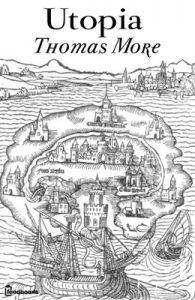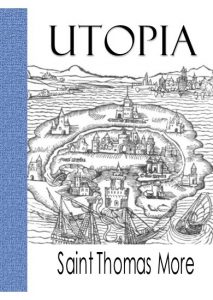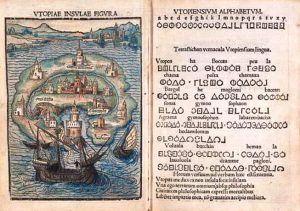Utopia – Sir Thomas More – 1516

Posted by Steven on 1/11/2013, 12:11:19
Here is my review of Utopia, followed by some random thoughts on More’s Utopia compared to Plato’s Republic. In a separate post I’ll just list my other past and planned reading, and if there are any you are particularly interested in, I can post those reviews too.
Utopia by Thomas More
First published in Latin 1516
English translation by Paul Turner 1965
Utopia is simply one of the most important and influential books ever written. Its ideas were then (and for the most part still are) so revolutionary that it can be difficult to believe a man with Thomas More’s subsequent history even intended them to be taken seriously.
More wrote Utopia in Latin, the language most widely read at the time by educated persons in Europe. It is also a language independent of place and time, which translator Paul Turner says is ample justification for using informal contemporary English in his translation. The result is highly readable and entertaining, but no less thought-provoking.
The structure of the novel has More himself recounting a conversation he had with a traveler named Raphael who had spent five years living in Utopia, an island roughly 200 miles in diameter located somewhere in the New World. More has all the opinions and observations come from Raphael’s mouth rather than his own, obviously to protect himself from being charged with promoting seditious ideas. But while Utopia does satirize a few of Europe’s governments and institutions, it is not an attack on any particular person or country, and this is what has kept it relevant over the centuries.
The most radical and most important feature of Utopia is that there is no private property and therefore no need for money. People dress identically and live in identical houses in identical towns. They each work at the trade for which they are best suited, usually the same as their parents. Families are sent in rotation to work on farms, the assumption being that farm work is less pleasant and should be shared by all. Military training is compulsory for both sexes, and the entire town is turned out from time to time for major projects such as roads, bridges, and fortifications. Slavery exists, but only as a form of punishment for serious crimes. All children are born free and equal and raised in identical circumstances.
With no need for luxury goods and no idle classes, productivity is so high that Utopians need work only six hours a day. The rest of the time is devoted to self improvement and recreations such as music. Utopians do their work gladly, for the most part, out of community spirit. But those who might otherwise slack off know that “Everyone has his eye on you, so you’re practically forced to get on with your job, and make some proper use of your spare time.” Goods are taken to markets and storehouses where anyone who needs something just helps himself. Meals are served in communal halls where the elders are served first out of respect.
There is freedom of religion in Utopia, at least to a point. Citizens are expected to believe in a creator and an afterlife and to attend religious services, but there is no official dogma, and sects are allowed to follow their own beliefs and practices as long as they don’t proselytize in public. Atheists are tolerated, but they are considered contemptible and are barred from positions of public trust. That Thomas More would write something advocating religious toleration has always been puzzling, since he later ordered heretics burned at the stake and gave his own life in defense of the supremacy of the Catholic Church. More also mortified his own flesh by wearing a hair shirt despite having written in Utopia that it was as important to be kind to yourself as it was to be kind to others, and that it was ridiculous to suffer unnecessarily.

Women in Utopia are subordinate at all times to their husbands, but may serve in the military and even as priests (provided they are widows). Their role in political life isn’t addressed. Considering how revolutionary Utopia is in other respects, it is strangely conventional in sexual matters–probably reflecting More’s own prudery. Marriage is for life except in rare circumstances, and any sex before or outside of marriage is severely punished, sometimes by enslavement or death. In a country where there is no private property and therefore no inheritance and no need to worry about legitimacy, where the pursuit of pleasure is considered a laudable goal, and where children are moved from one household to another to learn different trades, such rigid insistence on monogamy seems out of place.
There is much more in Utopia on such things as foreign trade, warfare, education, medicine, aging and city planning. But what comes across most forcefully is the evil of the inequitable distribution of resources which is inevitable in a capitalist economy. The Utopians found one way to address this, a communist solution which many have since tried to emulate, at least in part.
And some additional thoughts on Utopia versus The Republic
More mentions Plato’s The Republic once or twice in Utopia and this invites comparison. There are some similarities, but many more differences.
Both are communist societies that abjure private property and money. Poverty cannot exist, as the equitable sharing of resources is guaranteed.
Utopia is an egalitarian society and a democracy, the Republic is neither. The Republic has a strict caste system with a “Guardian” class at the top. Mobility between classes is rare: if you are born the son of a stonemason you will become a stonemason. The Republic is ruled by a philosopher king chosen for life from among the Guardian class. In Utopia there is universal (male? he doesn’t say) suffrage, and everyone is eligible for public office. Children traditionally take up the occupations of their parents, but they are not required to.
The Republic has a state religion, but observances are largely ceremonial. Utopia allows religious freedom within a broad monotheistic context, but religious life is interwoven into public life.
Utopia has a very conventional family life and conservative sexual mores. The only unconventional idea is that the bride and bridegroom are shown naked to each other before they are married so they know what they are getting. The Republic has traditional marriage for all classes except the Guardians; they are scientifically bred each year to produce the best possible outcome, and children and parents are unknown to each other.
The Republic is a militaristic state which glories in war. Its highest class, the Guardians, are the warriors. In Utopia all citizens, male and female, have military training, but they prefer not to fight if possible. The gold they accumulate in foreign trade is used principally to hire mercenaries or bribe enemies so that Utopians do not have to risk their lives in battle. They are so averse to bloodshed that the job of slaughtering cattle is done by slaves (who are convicts or prisoners of war, not a hereditary class).
Utopia prizes knowledge, welcomes new ideas, and encourages self study. They aren’t afraid of being corrupted by outside influence. In the Republic all arts and ideas that would undermine public morale are prohibited, and this includes all fiction.
I think I would much rather live in Utopia than The Republic.
